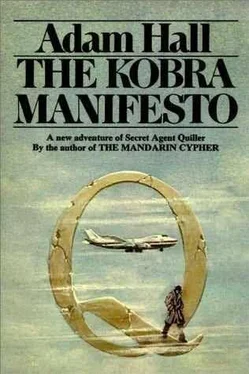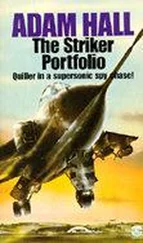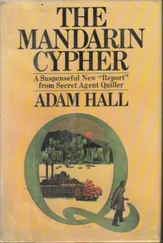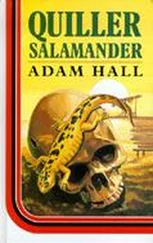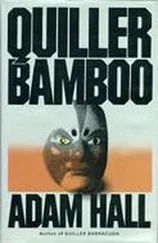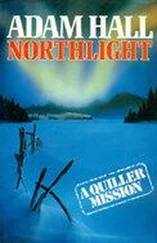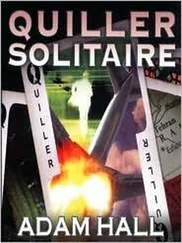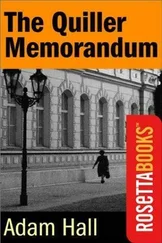22:59.
The first of the passengers off the Moroccan flight was just reaching the exit gate and I stood facing in that direction as the rest of them began coming through, spreading out into groups and individuals, many of them in robes, the fez much in evidence.
I would recognize Fitzalan because we saw each other sometimes along the corridors of that mildewed mausoleum in London, and a month ago we'd shared a table in the Caff for a salt beef sandwich because I needed information on the Helsinki airport explosion and he'd been there.
I would recognize Fogel because I'd questioned him for three hours in Budapest while they were getting the bullet out by the light of one 40-watt bulb and with no anaesthetic, studying the hawklike face as the scream of the sirens rose and fell among the distant streets.
He wasn't on the Moroccan flight, Nor was Fitzalan, 23:12. Iberian.
Blank.
23:25.
Alitalia, Blank.
Then there was a longer interval and I went across to the trattoria for some milk, suggest supplementary intake of 100 mg Calcium, so forth. An Air France transit flight was due to land at midnight and I went back to the Cielalto office and checked the new arrivals in the main hall. There were only three or four and none looked suspect. A few Greeks left over from the last Alitalia flight were still hanging around Hertz and Avis and a dozen or so people were now coming in to meet the Air France plane. A group of porters moved slowly back to the baggage claim area, one of them singing quietly. A huge woman in black heaved past me, her face streaming with tears, and a small boy was throwing an aerodynamic disc high across the porters' heads.
I went over to check for a message and came back, doing a systematic sweep of the hall and noting people's movements. If one contact in any given rendezvous is blown, the other is left totally ignorant of the fact that he is moving straight into a trap. It happened on a dockside in Reykjavik two years ago when I had a rendezvous with Tremayne and they caught up with him and trod on his face and put a few questions and when I walked into the shadow of the crane they were there with icepicks, three of them. I got out fast but they began using some kind of repeater rifle and it was only the moonlight that saved me but oh God that water was cold.
That is why my index finger, left hand, is missing: I caught it between two planks at the edge of the dockside as I went over. And that is why I watched the two men coming across from the main doors, and the group of students waiting at the far end of the check-in counter, and others. By moving around I altered their lines of sight and they didn't respond; but the two men in dark suits were also moving, their eyes covertly observing as mine were. ' They had checked me twice but made no follow-up: no movement away, no sign to a distant contact. Within the next three minutes they hadn't looked at me again and there was no reflective surface where they could watch me. I put them down provisionally as Italian police, detective branch, because of their shoes, their spits, their hats, the way they stood. They weren't out of an intelligence cell: I've seen hundreds of intelligence men and I've seen hundreds of police-men, detective branch, and on one point alone I was willing to lay my bet: you are as liable to see an intelligence man wearing those neat, cheap tailor's-dummy clothes as you are liable to see him wearing a Guy Fawkes mask and a piss pot on his head.
In one minute I checked Alitalia again for any message for Paul Wexford. Negative. If Fitzalan had come unstuck in Tangier at any time up to the departure of the plane Fogel had taken, the Bureau's man-in-place would have flashed London and London would have flashed me in Rome and that was why I had to make regular visits to Alitalia. If Fitzalan had in fact boarded Fogel's plane and been recognized as a surveillance hazard there was nothing Fogel could do about it unless by a thousand-to-one chance he was able to have the pilot radio the tower here with a message in code for a specific contact, in which case I was blown wide open as I stood here but I went on standing here because the odds of a thousand to one are acceptable.
Fogel was a wildcat operator without any kind of network behind him and I was virtually certain that even if he could call upon active support in Rome he couldn't do it before his plane was on the ground and he could reach a telephone.
From here I could see the telephones.
I could also see why Egerton had been so sure that Fitzalan would be able to keep his rdv with me and maintain surveillance on Fogel at the same time: the Cielalto office had been chosen because it was within sight of the exit gates where Fogel must arrive.
The faint whine of jets came through the walls of the building, then the roaring of reversed thrust. Eight minutes overdue at 00:08. Possibly slight headwinds, or traffic congestion.
For the last time I went to check Alitalia for a message and there wasn't one.
00:21.
The porters began moving across to the customs area.
The two plain-clothes men had now taken up overt station. They were interested in the Air France flight but only in general terms: if they were here to pick anyone up they would either have gone out to the plane or moved across to the exit gates. They had forgotten my existence.
'He'll be coming through in a few minutes.'
'All right,' I said, We stood close together, watching the smiling skier.
'So far, I've got him cold.'
Fitzalan sounded rather pleased with himself and I suppose it was understandable because a surveillance situation gets very sensitive in confined spaces.
He was still breathing a little fast: he'd obviously shown his Interpol facilities pass to the chief stewardess and the immigration officer and got through the tube before the rest of them had been released and from then on he'd hurried. I'd seen him coming across from the exit gates and the two plain-clothes men had checked him and lost interest. Fitzalan himself had given me no signal as he'd approached the rendezvous and it couldn't have been because it's a difficult thing to do: you can look up at the ceiling for an instant or turn your head or drop something or make any one of a dozen signals. The one we use as a routine in the absence of a specific change by directive is the slight trip. He hadn't tripped.
But he would have done it if he'd been blown in Tangier or on board the aircraft, because if you go down and the opposition starts running you and you can't help yourself until there's been time to get out from under, you can at least let your contact know in the final half-minute that the rendezvous had become a death-trap, and if he's quick he can save himself.
There'd been no signal. At this precise moment the situation was contained and even encouraging: Heinrich Fogel and two of the Bureau's executives were now together in Fiumicino Airport, Rome, their formation as orderly as if Control in London had moved three pieces across an operations board.
I watched the exit gates.
'Is he alone?'
'Yes.' There was still a note of slight elation in Fitzalan's voice: the Bureau had only been running him for eighteen months and he'd blown a minor radio-snatch assignment in Brussels and was immediately pushed through Norfolk again for a refresher course, and this time he was out to prove his colours and so far he was getting it right. A surveillance operation is low key but in this case the objective was Fogel and the overall situation was massive in terms of deployment in the field, 'You know what you're here for,' he said quietly. It was a statement.
'No.'
He swung his head and looked at me and I noticed the Mack dye was running slightly at his temples. Fitzalan has bright red hair and is obliged to keep it permanently dyed.
Читать дальше
